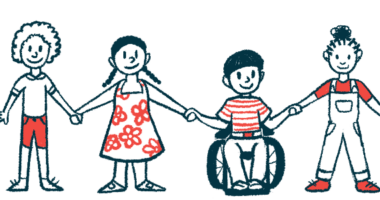Epidiolex Seen in Phase 3 Trial to Significantly Lessen Drop Seizures in Rare Form of Childhood Epilepsy, Study Reports

GW Pharmaceuticals has published positive results of its Phase 3 trial testing Epidiolex, the company’s cannabis-based oral therapy, in people with treatment-resistent Lennox-Gastaut syndrome (LGS).
The results, published in the journal The Lancet, also carry promise for Dravet syndrome, another rare and difficult-to-treat epilepsy, as this therapy is currently being tested in Dravet patients.
The study, “Cannabidiol in patients with seizures associated with Lennox-Gastaut syndrome (GWPCARE4): a randomised, double-blind, placebo-controlled phase 3 trial,” showed that Epidiolex, given as an add-on or adjunct treatment to the median of three other anticonvulsant therapies being used, significantly decreased the frequency monthly drop seizures compared to placebo in these LGS patients. Epidiolex was generally well-tolerated and safe.
The multicenter CARE4 (NCT02224690) study recruited a total of 171 LGS patients (mean age 15 years) whose seizures failed to respond to treatment with a median of six antiepileptic medications. Patients were randomized to receive either 20 mg/kg of oral Epidiolex (86 patients) or placebo (85 patients) for 14 weeks: a two-week dose escalation period followed by 12 weeks of maintenance therapy.
All were refractory patients (i.e., those inadequately managed by anti-epileptic drugs, both previous and current treatments), and had at least two drop seizures each week during a four-week baseline (pre-treatment) period.
The study’s primary endpoint was the change from baseline in number of drop seizures recorded during the treatment period in those randomized to recieve Epidiolex and those given a placebo.
Researchers defined drop seizures as “atonic, tonic or tonic-clonic seizures involving the entire body, trunk or head that led or could have led to a fall, injury, slumping in a chair or hitting the patient’s head on a surface.”
At baseline, patients had a median frequency of 74 drop seizures per month. Compared to placebo-treated patients, those on Epidiolex had a significantly higher median decrease in drop seizures — 22% versus 44%, respectively. Importantly, improvements in drop seizure rates in patients on Epidiolex were detected in the first month of treatment and maintained.
Additional (secondary) endpoints also supported Epidiolex’s efficacy: 44% of the patients had a 50% or higher reduction in drop seizures compared to 24% of placebo controls; and the total seizure frequency was significantly reduced in 41% of Epidiolex-treated patients versus 14% in placebo. Also, Epidiolex was associated with a significantly higher improvement in patients’ overall condition than placebo – 58% versus 34% – according to the Subject/Caregiver Global Impression of Change (S/CGIC) scale.
Overall, Epidiolex was well-tolerated, with 86% of Epidiolex-treated patients and 69% of those on placebo reporting mild or moderate adverse effects. The most common included diarrhea, somnolence, pyrexia, decreased appetite, and vomiting. Adverse effect were resolved in 61% and 64% of Epidiolex and placebo patients, respectively, upon the trial’s completion.
A total of 12 patients taking Epidiolex discontinued treatment as a result of side effects, as did one on placebo, mostly in relation to treatable and “transient elevations in liver enzymes,” the study reported, and no “so-called stoned-like effects” were among recorded side effects of treatment.
Serious adverse effects were reported in 20 people given Epidiolex, compared with four placebo patients. These mostly involved elevated levels of transaminase, an enzyme that can indicate liver damage, and were resolved. Whether they were related to Epidiolex or other anti-epileptic medications being used, particularly valproate, was not clear. One patient died of acute respiratory distress syndrome, found to be unrelated to treatment.
The results of this randomized, placebo-controlled trial suggest that Epidiolex as an add-on therapy for existing antiepileptic drug regimens can significantly reduce the frequency of seizures in treatment-resistant LGS patients, and potentially those with Dravet syndrome, for which there is currently no approved treatment.
Recently, the U.S. Food and Drug Administration (FDA) granted priority review to a New Drug Application submitted by GW Pharmaceuticals for Epidiolex as treatment for LGS and Dravet syndrome. The therapy is also under review by the European Medicines Agency (EMA). The FDA’s decision is expected on or before June 27, 2018, and EMA’s in early 2019.
GW’s application is supported by the results of several clinical trails in Dravet syndrome and LGS.
The first Phase 3 study testing Epidiolex in children and young adults with Dravet syndrome, CARE 1 (NCT02091375), evaluated whether Epidiolex could lower the number of patients’ monthly convulsive seizures compared to placebo. A total of 120 patients with drug-resistant seizures received either Epidiolex oral solution daily at a dose of 20 mg per kilogram of body weight or placebo, in addition to standard antiepileptic treatment for a total of 14 weeks.
Results were also published in the study, “Trial of Cannabidiol for Drug-Resistant Seizures in the Dravet Syndrome” in The New England Journal of Medicine, showing that Epidiolex led to a statistically significant reduction of 39% in patient seizure frequency compared to 13% in the control group, but were also associated with higher rates of adverse events.
Following this study, GW launched a second Phase 3 trial, CARE2 (NCT02224703), evaluating Dravet syndrome patients’ response to either a low or high dose of Epidiolex given for 14 weeks. The study planned to enroll 150 participants, both children and adults. Currently, enrollment has finished but no results are available.
CARE4’s positive results in hard-to-treat LGS patients were welcomed by the company.
“Publication of this landmark study by The Lancet is an exciting achievement and marks the second time that Epidiolex data have been published in a highly prestigious journal,” said Justin Gover, GW’s CEO, in a press release. “These publications highlight the potential of Epidiolex to address the significant unmet need in LGS and Dravet syndrome, two very challenging epilepsy conditions, and we look forward to working with the FDA and EMA as they review our marketing applications for Epidiolex.
“We are absolutely focused on the goal of making this important new medicine available to appropriate patients and their caregivers as quickly as possible,” Gover added.
Children and adults with Dravet syndrome or LGS who participated in a previous CARE trial may be eligible to join the multicenter, open-label extension CARE5 study (NCT02224573). This trial will assess Epidiolex’s safety, and participants will be followed either until Epidiolex is approved to treat Dravet syndrome or LGS, or for a maximum of three years. In the U.S. and Poland, these patients can enroll in the open-label part of the CARE7 study (NCT02954887). Information is available by clicking on a trial’s identification number.






